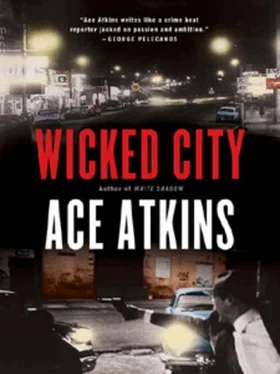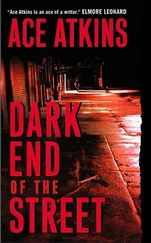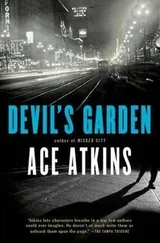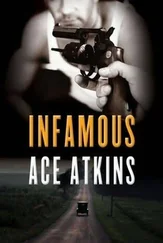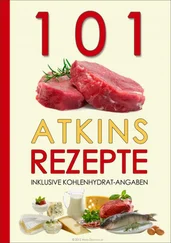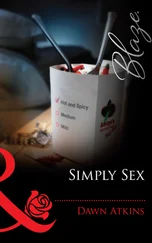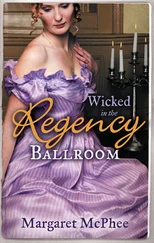The girl moved to her knees and found purchase against the car, one hand covering the ripped place on the thin shirt, her legs scraped bloody. Her cotton underwear had turned a damp yellow from where she’d urinated while being dragged and beaten.
“You are the worst kind of coward,” I said. “I know your secret. You hide behind the gun.”
Fuller nodded with the words and then went for the belt and unlatched it, the leather and gun falling to the asphalt.
“Come on.”
“Let them go. I don’t want to fight.”
“They’re coming with me. And so are you, after I whip your ass.”
The crowd became a ring, the asphalt the canvas, and my vision shifted from the kids and townspeople, and even the two men in khaki uniforms who stood just on top of the hill but didn’t move.
I put my hands out, showing my palms, and shook my head and turned my back.
And that’s when Fuller rushed and tackled me to the ground and pounded into my kidneys with his fat fists. But I was up and standing, with Fuller grasping for his feet and then taking huge, muscled punches toward me that I sidestepped without losing a breath. And more wild punches did not even make a bit of breeze near my ears, as I moved and bobbed and weaved with an instinct that came to me as natural as walking, although I hadn’t practiced the science for more than fifteen years.
I found my feet and balance and kept my fist raised to my jaw, although Fuller never connected a single punch, finally growing out of breath and red-faced. He jumped on me again and pummeled with his fists, but I wrenched from Fuller’s grasp and moved backward, the ring disappearing now, seeing the faces and people yelling and cheering, and Fuller’s uniform coming undone, his deputy’s star clapping to the ground from his wrinkled, sweaty shirt, the hat laying crown down on the ground. And I moved more, working him into a slow circle, keeping him slow and ragged and awkward and clumsy, as cheers and yells came from more faces perched on the hill. Backs that had turned before now turned and watched us, and I took a breath, feeling all of them behind me and not wanting to, knowing the ease of what I was about to do was not even a task. I sidestepped Fuller and moved him about, setting him in a perfect stance, posing him as a sculptor works his model, and then with Fuller leaned back, hands dropped by his potbelly, I worked three quick punches. One, two, three. Again. One, two, three. Kid Weisz screaming in my ears.
The two, the cross, connected with the head, spewing a plug of tobacco from Fuller’s mouth, and the three, the hook, connected with sinew and bone of the ribs and I felt the crack and compression up through my knuckles. Fuller lost his balance, his eyes wide in surprise as his body failed him, and he teetered backward, falling toward Moon Lake and onto his back, rolling and rolling down a hill of stone and scree, coming to rest in a defeated heap as, up on the hill, people pointed at him as they would a circus oddity. I knew what would bother Fuller most was the laughter, the laughter coming from grown men and women, not just the awkward, bloody humor of it all, but like a great rush of wind coming through in gigantic release.
I felt hands on my back and words in my ears. But I walked through them and reached down for the girl, unbuttoning my shirt and handing it to her. I stood there in my undershirt and turned to Reuben’s boy, asking him if he needed a ride home. But he didn’t answer. He just nodded over and over, too shaken to talk, and grabbed Lorelei’s hand and disappeared into the crowd.
When I returned to the blanket, Joyce held Thomas up in her arms and to her chest and she paced. Anne looked to me and then back to her mother. I looked to my wife and she just shook her head. “They wanted to go see the show,” she said. “But I kept them here. Right here on this damn blanket.”
“What was it?” Anne asked.
I got down on my knee and pretended to pull a quarter from her ear.
“I haven’t fallen for that one for five years, Dad.”
I shrugged, hearing the sounds of sirens in the distance.
Two men approached from the lakeshore and walked toward us. One was Jack Black, the big soldier who reminded me of a professional wrestler.
Joyce handed me some ice wrapped in a towel and I placed it over my knuckles.
“I could’ve sworn I saw you watching up on the hill, Major Black.”
Black crossed his arms over his massive chest and smiled: “You must be mistaken. We’re just here to restore order.”
“What do you call that?” I said. “Pretty stupid, huh?”
“I’d call it a hell of a start, chief.”
ARCH LIT HIS NINETEENTH CIGARETTE OF THE NIGHT, BORROWING a second pack from one of Bernard Sykes’s young prosecutors, who hovered in the room like it was a stag party, and sank back into the uncomfortable chair, answering more questions. A negro man in whites brought another pot of coffee up to the suite of the Ralston Hotel, and Arch drank another cup and answered the questions with a firm yes or no, trying not to elaborate any more than was necessary. Sykes paced the room. They’d been there all day and night, and Arch had lost track of the time hours and hours ago, and the little man at the desk would peck away on his little machine, taking down every word they said.
“Can I please go? This doesn’t have a thing to do with that grand jury mess.”
“As I’ve said to you, Mr. Ferrell, you will be taken to Birmingham in the morning to answer to your charges of vote fraud. But I’m afraid this is all the same mess.”
“That’s a lie and could be considered slander.”
“How’s your headache?”
“I’m fine.”
“Do you need more coffee?”
“No, I don’t need any more goddamn coffee. And my drinking is my own goddamn business. There was no call to have those boys come in and bust in on me like I was a common criminal.”
“Would you please continue about the morning of June eighteenth?”
Arch’s head fell into his hand and he squeezed his temples with his fingers. “Like I’ve said, I got up and took my daughter’s puppy out. Do you want to know how many times it shit?”
“If you think it would help,” Sykes said.
“Twice. I’ll collect the evidence for you.”
“Then what?”
“I ate breakfast. Bacon and eggs. Grits, too. Then I walked my property. I thought about maybe doing some yard work. My garden needed to be cultivated and weeded.”
“Don’t you work on Fridays?”
“No, I had the day off. I hadn’t had much sleep. Maybe three hours all week.”
“Why didn’t you sleep?”
“You wouldn’t sleep either if you had crusading idiots out there calling you the brains behind the Phenix City Machine.”
“Are you?”
“As I told the press, I think that’s giving my brains too much credit.”
“Did you work in your garden?”
“No, I wasn’t feeling well. This man came over who wanted to buy some timber. His name’s Perdue. Don’t ask me his first name ’cause I don’t recall. He owns a sawmill somewhere around here, and I put my boots on and walked my land showing him what could be thinned.”
“What about the rest of the day?”
“I returned home and, I don’t know, just read the paper. I fell asleep in my chair.”
“Why did you go back to the courthouse, sir?”
“I went back because I had a mess of paperwork. I needed a day off. But, hell, when you’re the solicitor you work all the goddamn time. Can I please get some more cigarettes in here?”
Sykes nodded to another attorney and the attorney set a pack of Camels before Arch. Arch looked up at the boy, who smiled, and Arch gave him an eat-shit grin, popping the cigarette into his mouth. After a few moments of Arch sitting there looking at Sykes, Sykes leaned in with a Zippo and lit the cigarette.
Читать дальше
